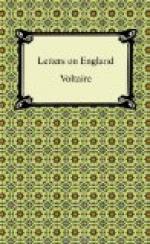I am a body, and, I think, that’s all I know of the matter. Shall I ascribe to an unknown cause, what I can so easily impute to the only second cause I am acquainted with? Here all the school philosophers interrupt me with their arguments, and declare that there is only extension and solidity in bodies, and that there they can have nothing but motion and figure. Now motion, figure, extension and solidity cannot form a thought, and consequently the soul cannot be matter. All this so often repeated mighty series of reasoning, amounts to no more than this: I am absolutely ignorant what matter is; I guess, but imperfectly, some properties of it; now I absolutely cannot tell whether these properties may be joined to thought. As I therefore know nothing, I maintain positively that matter cannot think. In this manner do the schools reason.
Mr. Locke addressed these gentlemen in the candid, sincere manner following: At least confess yourselves to be as ignorant as I. Neither your imaginations nor mine are able to comprehend in what manner a body is susceptible of ideas; and do you conceive better in what manner a substance, of what kind soever, is susceptible of them? As you cannot comprehend either matter or spirit, why will you presume to assert anything?
The superstitious man comes afterwards and declares, that all those must be burnt for the good of their souls, who so much as suspect that it is possible for the body to think without any foreign assistance. But what would these people say should they themselves be proved irreligious? And indeed, what man can presume to assert, without being guilty at the same time of the greatest impiety, that it is impossible




